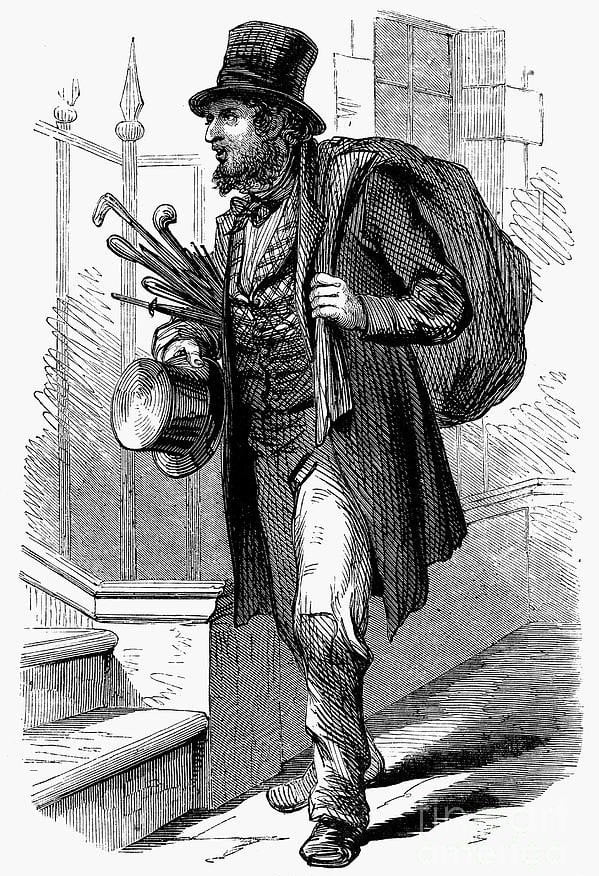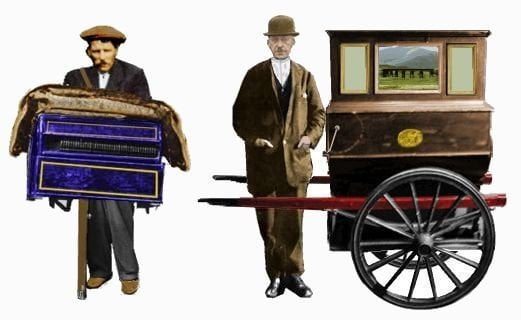Between the two World Wars many young men would be seen peddling goods from door to door, especially in the country villages. Most of these men were ex-servicemen who after spending years in the 1914 to 1918 war had no job to come back to. so would set out with a little box of pins, needles, cotton. tapes etc.. so that folks who could not get into town, could take an advantage of what the peddler offered, and purchase whatever they needed.

I remember mother or Auntie answering the knock on the door, there the peddler would open up his box of trade on the doorstep. or if it was raining would be asked indoors to keep the goods dry. How trusting people were then, and how much they appreciated that way of buying some thing they needed, so they could stock up with some of his wares. Some peddlers would haul around a suitcase containing towels, aprons, pillowslips, roller towels etc., probably having more cash to purchase what they needed to sell; this way of earning a livelihood. no doubt, kept the “wolf from the door”.
There was often a knife and scissors grinder coming to villages and towns on his “bike”, he would turn a wheel on which a sort of “razor strap” would revolve and would use this to sharpen whatever the householder wanted done, including hedge clippers. He was well known and would often bring messages from one village to another, receiving a welcome cup of tea from a satisfied housewife.
Another “caller” was one who would rivet broken crock-ery together. I did not manage to look at how that was done, but I know mother has had old plates she valued, riveted together and when finished looked as if a fine piece of wire was holding it together; maybe it was some sort of solder. was too young to understand, but know those that had that done to any priced bit of “cleam” as we called it, were pleased. Today one would use superglue to repair a show-piece of china.
There was another man who would bring around Herby Beer. He came from a nearby village and would bring it around on his pony-trap or a hand cart. The beer was con-tained in a barrel with a tap in the hung hole, and was sold for 2d or 3d a pint, If one walked to the place he lived, there would be a table in a little garden with a “form” for seating and his wife would bring out Herby Beer, tea and heavy cake to sell as refreshment for hikers – the early country tea garden, I suppose.

At times a “Hardy Gurdy” man with a barrel organ would visit. playing old music hall songs. One I recall, was accompanied by a little chained monkey, who would hold out a cap, in which the passers by, or those standing around would toss their coppers. There was a man and woman singer with lovely toning voices, who would entertain with the up to date songs and old favourites; they were a plea-sure to listen to. I do not remember them on the roads by the time the Second World War came, so perhaps they got too old, or it was too dangerous for them to traipse around.
The stoneman breaking up big stones for stone chip-pings, was another familiar sight. He would be seated on the ground in a lay-by, for ever breaking up rocks with a sledge hammer. i can visualise the one we passed on our way to Auntie’s home. He usually wore a collarless shirt, cord trousers bound with twine just over his heavy hob nailed boots.. This must have been a summer time task, as in the winter that lay-by was deserted. My aunt felt sorry for him. She told us before the 1914 to 1918 war, he held a good job. but the depression in all work after, had put him and many others into doing odd bits of work if they could get it. People did care for one another then, none of this “I’m all right Jack” business. So, 1 for one, am glad to have known the days, when even if one was not “well off” themselves, they would open their door, or give a copper or two to some one really in need.